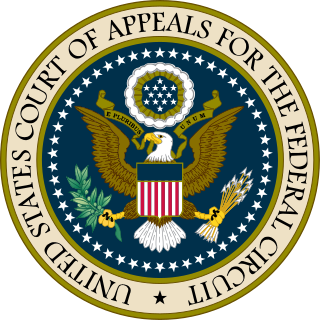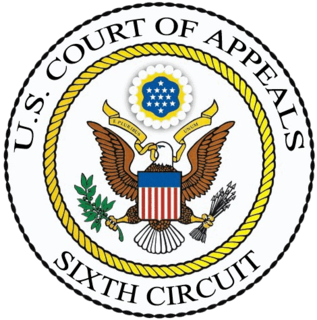
The Sixteenth Amendment to the United States Constitution allows Congress to levy an income tax without apportioning it among the states on the basis of population. It was passed by Congress in 1909 in response to the 1895 Supreme Court case of Pollock v. Farmers' Loan & Trust Co. The Sixteenth Amendment was ratified by the requisite number of states on February 3, 1913, and effectively overruled the Supreme Court's ruling in Pollock.

The United States Court of Appeals for the Federal Circuit is a United States court of appeals headquartered in Washington, D.C. The court was created by Congress with passage of the Federal Courts Improvement Act of 1982, which merged the United States Court of Customs and Patent Appeals and the appellate division of the United States Court of Claims, making the judges of the former courts into circuit judges. The Federal Circuit is particularly known for its decisions on patent law, as it is the only appellate-level court other than the Supreme Court with the jurisdiction to hear patent case appeals.

The United States Tax Court is a federal trial court of record established by Congress under Article I of the U.S. Constitution, section 8 of which provides that the Congress has the power to "constitute Tribunals inferior to the supreme Court". The Tax Court specializes in adjudicating disputes over federal income tax, generally prior to the time at which formal tax assessments are made by the Internal Revenue Service.
Northern Insurance Company of New York v. Chatham County, 547 U.S. 189 (2006), is a United States Supreme Court case addressing whether state counties enjoyed sovereign immunity from private lawsuits authorized by federal law. The case involved an admiralty claim by an insurer against Chatham County, Georgia for its negligent operation of a drawbridge. The Court ruled unanimously that the county had no basis for claiming immunity because it was not acting as an "arm of the state."
Tax protesters in the United States have advanced a number of arguments asserting that the assessment and collection of the federal income tax violates statutes enacted by the United States Congress and signed into law by the President. Such arguments generally claim that certain statutes fail to create a duty to pay taxes, that such statutes do not impose the income tax on wages or other types of income claimed by the tax protesters, or that provisions within a given statute exempt the tax protesters from a duty to pay.

Marrita Murphy and Daniel J. Leveille, Appellants v. Internal Revenue Service and United States of America, Appellees, is a controversial tax case in which the United States Court of Appeals for the District of Columbia Circuit originally held that the taxation of emotional distress awards by the federal government is unconstitutional. That decision was vacated, or rendered void, by the Court on December 22, 2006. The Court eventually overturned its original decision, finding against Murphy in an opinion issued on July 3, 2007.

Miller v. Commissioner, 733 F.2d 399 was a case in which the United States Court of Appeals for the Sixth Circuit held that taxpayers are allowed to claim deductions for economic detriments which are a loss and not compensated for by insurance or otherwise regardless whether the property was insured or not.

Pevsner v. Commissioner, 628 F.2d 467 is a United States federal income tax case before the Fifth Circuit. It dealt with the issue of whether clothes purchased solely for use at work could be treated as a business expense deduction on a taxpayer's return.

Commissioner v. Boylston Market Association, 131 F.2d 966 was a taxation case decided by the United States Court of Appeals for the First Circuit.
Uniformity and jurisdiction in the tax decisions of the United States federal courts. is the ongoing debate spanning many decades about achievement of uniformity and decisionmaking by federal courts when addressing tax controversies against the backdrop of multiple, regionally diverse courts with federal tax jurisdiction.

Salvatore v. Commissioner is an opinion from the United States Tax Court that holds that a taxpayer cannot avoid paying taxes on the sale of property by first conveying that property to someone else. This opinion was later affirmed by the United States Court of Appeals for the Second Circuit. This case outlines some limitations on the "fruit-and-tree" metaphor established in Lucas v. Earl, 281 U.S. 111 (1930) and further developed in Helvering v. Horst, 311 U.S. 112 (1940). Decided in 1970, the case arose when a taxpayer tried to avoid paying capital gains tax from sale of property by giving a share in that property to her children. She then paid a gift tax, which is significantly less than the tax on the gain would have been if she had not given a share to her children.
Commissioner v. Banks, 543 U.S. 426 (2005), together with Commissioner v. Banaitis, was a case decided before the Supreme Court of the United States, dealing with the issue of whether the portion of a money judgment or settlement paid to a taxpayer's attorney under a contingent-fee agreement is income to the taxpayer for federal income tax purposes. The Supreme Court held when a taxpayer's recovery constitutes income, the taxpayer's income includes the portion of the recovery paid to the attorney as a contingent fee. Employment cases are an exception to this Supreme Court ruling because of the Civil Rights Tax Relief in the American Jobs Creation Act of 2004. The Civil Rights Tax Relief amended Internal Revenue Code § 62(a) to permit taxpayers to subtract attorney's fees from gross income in arriving at adjusted gross income.

Warren Jones Company v. Commissioner of Internal Revenue, 524 F.2d 788 was a taxation decision by the United States Court of Appeals for the Ninth Circuit.
Tax protesters in the United States advance a number of constitutional arguments asserting that the imposition, assessment and collection of the federal income tax violates the United States Constitution. These kinds of arguments, though related to, are distinguished from statutory and administrative arguments, which presuppose the constitutionality of the income tax, as well as from general conspiracy arguments, which are based upon the proposition that the three branches of the federal government are involved together in a deliberate, on-going campaign of deception for the purpose of defrauding individuals or entities of their wealth or profits. Although constitutional challenges to U.S. tax laws are frequently directed towards the validity and effect of the Sixteenth Amendment, assertions that the income tax violates various other provisions of the Constitution have been made as well.
A tax protester is someone who refuses to pay a tax claiming that the tax laws are unconstitutional or otherwise invalid. Tax protesters are different from tax resisters, who refuse to pay taxes as a protest against a government or its policies, or a moral opposition to taxation in general, not out of a belief that the tax law itself is invalid. The United States has a large and organized culture of people who espouse such theories. Tax protesters also exist in other countries.

Anastasoff v. United States, 223 F.3d 898, was a case decided by the U.S. Eighth Circuit on appeal from the U.S. District Court for the Eastern District of Missouri. It is notable for being the only case to consider the "Anastasoff issue", that is whether Article Three of the United States Constitution requires a federal court to treat unpublished opinions as precedent.
Tax protesters in the United States advance a number of administrative arguments asserting that the assessment and collection of the federal income tax violates regulations enacted by responsible agencies –primarily the Internal Revenue Service (IRS)– tasked with carrying out the statutes enacted by the United States Congress and signed into law by the President. Such arguments generally include claims that the administrative agency fails to create a duty to pay taxes, or that its operation conflicts with some other law, or that the agency is not authorized by statute to assess or collect income taxes, to seize assets to satisfy tax claims, or to penalize persons who fail to file a return or pay the tax.

United States v. Quartavious Davis is a United States federal legal case that challenged the use in a criminal trial of location data obtained without a search warrant from MetroPCS, a cell phone service provider. Mobile phone tracking data had helped place the defendant in this case at the scene of several crimes, for which he was convicted. The defendant appealed to the Eleventh Circuit Court of Appeals, which found the warrantless data collection had violated his constitutional rights under the Fourth Amendment to the United States Constitution, but declined to order a new trial because the evidence was collected in good faith. The Eleventh Circuit has since vacated this decision pending a rehearing by the Eleventh Circuit en banc. United States v. Davis, 573 Fed. Appx. 925. On 5 May 2015, the en banc order upheld the use of the information. On 9th Nov 2015, the Supreme Court of the United States declined to hear this case on appeal.
King v. Burwell, 576 U.S. 473 (2015), was a 6-3 decision by the Supreme Court of the United States interpreting provisions of the Patient Protection and Affordable Care Act (ACA). The Court's decision upheld, as consistent with the statute, the outlay of premium tax credits to qualifying persons in all states, both those with exchanges established directly by a state, and those otherwise established by the Department of Health and Human Services.

Charles E. Moritz v. Commissioner of Internal Revenue, 469 F.2d 466 (1972), was a case before the United States Court of Appeals for the Tenth Circuit in which the Court held that discrimination on the basis of sex constitutes a violation of the Equal Protection Clause of the United States Constitution. Charles Moritz had claimed a tax deduction for the cost of a caregiver for his invalid mother and the Internal Revenue Service had denied the deduction. The law specifically allowed such a deduction, but only for women and formerly married men, which Moritz was not.











